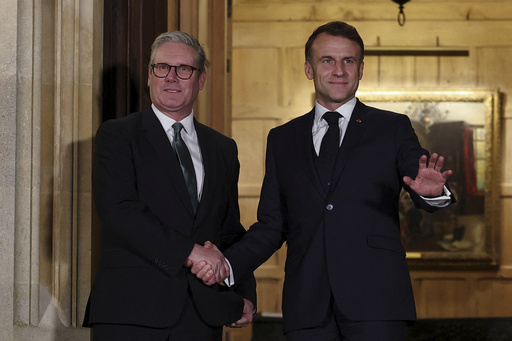
LONDON — This week, the leaders of Britain and France are both visiting Washington in a coordinated effort to persuade President Trump to maintain U.S. support for Ukraine amid the ongoing conflict with Russia. The objective is to prevent the potential abandonment of Ukraine as Trump pursues what he deems a peace agreement for the war that has lasted nearly three years.
Prime Minister Keir Starmer of the U.K. and President Emmanuel Macron of France are engaging in a diplomatic strategy that bears resemblance to the classic “good cop, bad cop” routine. Starmer adopts a more diplomatic tone, positioning himself as a bridge between the European nations and the U.S. administration, while Macron has critiqued Trump more openly, particularly regarding comments that seem to align with rhetoric favored by the Kremlin, as well as a perceived failure to adequately include Ukraine in discussions with Russia.
Both leaders emphasize that Ukraine’s interests and territorial integrity must remain central in any negotiations regarding the future of the conflict. Macron cautioned Trump against appearing weak in response to Russian President Putin, suggesting, “It’s not you, it’s not your trademark, it’s not in your interest.” Macron is set to visit the White House on Monday, marking the three-year anniversary of Russia’s invasion, while Starmer will follow with his visit on Thursday.
This round of diplomacy follows Macron’s recent convening of European leaders in Paris to strategize about the continent’s approach to the crisis. This comes after Trump claimed that both Macron and Starmer have failed to take meaningful steps to resolve the war during their respective tenures.
Macron, known for his assertive diplomatic style, plans to convey to Trump that the interests of the U.S. and Europe are aligned. He insists that allowing Russia to seize control of Ukraine would set a troubling precedent. Starmer, more reserved and risk-averse, has steered clear of direct confrontation with Trump while reaffirming Britain’s staunch support for Kyiv and countering Trump’s assertions that Ukrainian President Zelenskyy is a “dictator.” Starmer took the opportunity to speak with Zelenskyy on Saturday, reaffirming the U.K.’s support and commitment to securing a just peace, with a focus on protecting Ukraine’s sovereignty during discussions in Washington.
Some scholars argue that the foundation of Britain’s role as a transatlantic bridge may not be as solid as perceived. Oxford historian Margaret MacMillan notes that the concept of a “special relationship” tends to benefit Britain more than the U.S. Ultimately, both Macron and Starmer are working to maintain American involvement in European matters, but whether they will be successful remains uncertain.
During their meetings in Washington, both leaders will stress the necessity of having Ukraine included in discussions concerning its future. They aim to garner support for a concept that involves Europe deploying troops in a security “reassurance force” for Ukraine, emphasizing that the effectiveness of such a plan relies on U.S. backing, particularly in terms of air support to deter further Russian aggression.
Trump is likely to approach this proposal with skepticism, given his long-standing critique of NATO and concerns that the U.S. shoulders too much of the security burden for European nations.
In response, both Macron and Starmer appear willing to heed Trump’s calls for increased defense spending. Currently, France allocates just over 2% of its GDP to the military, and Macron has reiterated the need for European nations to bolster their military efforts. Meanwhile, the U.K. invests 2.3% of its GDP in defense, with Starmer indicating that this figure could rise to 2.5%. He is likely to specify a timeline for achieving this goal during his visit.
Experts suggest that Starmer might attempt to appeal to Trump’s desire for a legacy by framing the negotiations as a historical opportunity for him. “The main argument Starmer can use will be to say, ‘Mr. President, this will be your peace agreement. You did it and will be associated with it forever. Do you want to risk a failure?’” remarks retired NATO official Jamie Shea.
Trade issues and the potential threat of U.S.-imposed tariffs will also be central topics for both leaders during their discussions. Trump has previously implemented various tariffs affecting U.S. trading partners, which has raised concerns in Britain about securing favorable trade conditions post-Brexit. U.K. officials hope to leverage the country’s balanced trade relationship with the U.S. to minimize the impact of these tariffs.
Additionally, Starmer aims to address Trump’s controversial comments regarding Palestinians and land issues in Gaza, while also reassuring U.S. officials about a deal involving the Chagos Islands, which hold a significant U.S. military base. Should their diplomatic efforts falter, it has been suggested that Starmer may also present Trump with an invitation to visit from King Charles III, bringing an element of royal allure to his visit.

